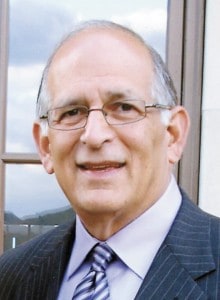
By Harvey Kart
Like most Americans, I absorbed the news about the shootings at Sandy Hook elementary school in Newtown, Connecticut first with disbelief, then horror, anger, fear and despair—the range of emotions felt by most human beings when confronted with such a senseless act of violence. This unimaginable event, perpetrated by a 20-year-old man with no direct connection to his victims, once again left most of us scrambling to answer one simple but elusive question: Why?
Almost immediately the expected over analysis of Newtown was (and continues to be) offered, often by those who purposefully or unintentionally would use such a tragedy to advance their own political or intellectual opinion. In the days since the shootings, against the backdrop of 20 beautiful little faces and those adults who died with them, we heard opinion after opinion as to how to avoid such a nightmare in the future.
Second Amendment supporters quickly denounced any extreme effort to limit gun ownership. Others argued that the proliferation of guns in America—especially those more suited for a battlefield than either hunting or personal protection—contributes mightily to loss of life. Others chose to look past the weapons to blame mental illness or the over-medication of society; the souring economy and the lack of opportunity offered in our country to young people; too much violence in movies, video games or on television; or even societal divisions stoked by extremists on the right and left.
If history is any indication, before long some new national issue will push Newtown off the front pages and it will be mostly forgotten by all but the families left to mourn their dead. That is, until the next deadly rampage occurs and the debating and finger-pointing begin anew.
When I first heard the news out of Newtown, I found myself retreating to an earlier time when I was a child and the world seemed so much safer and saner. Growing up six decades ago seemed far less threatening and much more hopeful than today. I know the world wasn’t perfect back then, and much of the societal uproar of the sixties, especially regarding fighting for more rights for women and minorities, were a necessary outgrowth of those sometimes not-so Happy Days.
But for most of us, happiness was found in a nurturing home, encouragement in school and a sense of belonging in our neighborhood where people waved to each other and friends always found a few minutes to cross the street to catch up. Even television back then, while sanitized to fit the mores of the times, offered down home wisdom from a Mayberry sheriff, loyalty from the family collie and fathers who knew best. Incorruptible individuals ensured that justice would prevail in the end and, whatever the challenge, a strong family would survive, prejudice and hatred would be exposed and hard work, decency and honesty would be rewarded.
What a difference a generation makes. Today, we glorify violence, we focus on our differences and we cheapen the value of relationships, virtues and even life itself. Whether mass media influences or merely reflects our culture, now it is awash in violence, crudity and decay. We glorify superficial relationships and one-night stands, we devalue human life and we ridicule anyone who espouses opinions or virtues that just a half-century ago were considered the standard.
We reward the most obnoxious, callous and obscene and ridicule the compassionate and caring. Good people in our society—and there are many—have been drubbed and droned into submission through threats of lawsuits, violence and labels.
We “friend” more people than is possible to know in a meaningful way and we prefer texting rather than hearing a human voice. Separated by glass screens and wireless technology, we feel more isolated and alone than ever before.
Yet, when the inexplicable taking of life occurs, we collectively scratch our heads and ask, “Why?”
And so the debate rages but there is irony even in the process. Where once we sought answers from each other—over the picket fence or at the corner market—now we gather information from talk radio or the Internet and tweet our instant opinions to a virtual world filled mostly with strangers.
Some suggest an armed guard in every school—a concession to violence we may need to accept—yet we discourage discipline or accountability for our students lest we offend someone.
Pundits and politicians rail about the horror of the latest mass shooting yet show little outcry over the daily loss of nameless, faceless young people in inner city streets.
We rekindle the debate over the need to change the Bill of Rights and to write stricter laws, yet we banish the 10 Commandments from public grounds even though the wisdom contained therein offers some sound guidance for all rationale, caring human beings regardless of religion.
We hold candlelight vigils to remember the fallen, yet we are not allowed to offer even the most antiseptic prayer in our schools even though the vast majority of Americans profess a belief in some form of all-loving and protective deity.
We look for quick fixes— often in the form of more limits to individual freedom—rather than looking into our collective souls and finding ways to change our hearts so that we once again value every human life.
In the sixties we talked about the Age of Aquarius and a new era of enlightenment. Yet we seem plunged into darkness. We’ve made incredible strides in technology but somehow sacrificed our humanity.
And until we figure out how to get that back, the tragedy that was Newtown, Denver, Blacksburg and Columbine most assuredly will come again. Perhaps next time to your community..







































